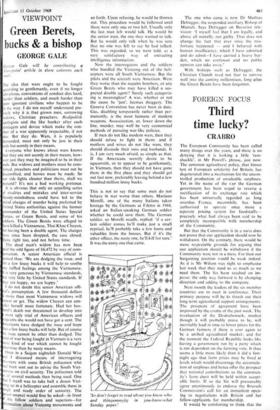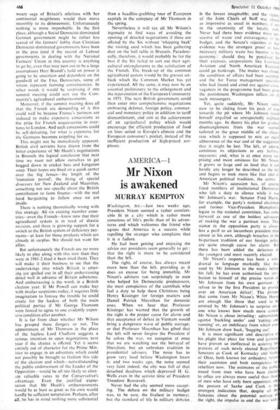FOREIGN FOCUS
Third time lucky?
CRABRO
The European Community has been called many things over the years, and there is no denying that it is looking a little 'ram- shackle', in Mr Powell's phrase, just now. The common agricultural policy, that litmus test of European solidarity for Britain, has degenerated into a mechanism for the uncon- trolled production of unsaleable surpluses. Yet in the name of the CAP the German government has been urged to reverse a rectification of its exchange rate which has been universally regarded as long overdue. France, meanwhile, has been authorised to operate once more a separate pricing system for foodstuffs— precisely what had always been said to be completely incompatible with membership of the Community.
But that the Community is in a mess does not prove that our application should now be withdrawn. On the contrary, there would be more respectable grounds for arguing that our application should be withdrawn if the Community were not in a mess. For then our bargaining position would be weak indeed. As it is Mr Wilson was right to emphasise last week that they need us as much as we need them. The Six have reached an im- passe: the only way forward is by changing direction and adding to the company.
Next month the leaders of the six member countries are to meet in conference. Their primary purpose will be to thrash out their long-term agricultural support arrangements. The prospects of agreement have been improved by the events of the past week. The revaluation of the Deutschemark, modest though it will probably prove to be, will inevitably lead in time to lower prices for the German farmers if there is ever again to be a unified agricultural market; and for the moment the Federal Republic looks like having a government run by a party which is not dependent on the farming vote. It thus seems a little more likely than it did a fort- night ago that farm prices may be fixed at levels which would discourage the accumula- tion of surpluses and hence offer the prospect that national contributions to the commun- ity's farm chest will be held within accept- able limits. If so the Six will presumably agree unanimously to endorse the Brussels Commission's call for an immediate open- ing to negotiations with Britain and her fellow-applicants for membership.
It would be comforting to think that the
weary saga of Britain's relations with her continental neighbours would then move smoothly to its denouement. Unfortunately nothing is more improbable. In the first place, although a Social Democrat-dominated German government might be rather less scared of the farmers' lobby than Christian Democrat-dominated governments have been in the past (and if the record of Labour governments in dealing with the National Farmers' Union in this country is anything to go by, even that may turn out to be a large assumption) Herr Brandt's hold on power is going to be uncertain and dependent on the goodwill of the Free Democrats, some of whom represent farming constituencies. In other words it would be surprising if one summit meeting could sort out the Com- munity's agricultural embarrassments.
Moreover, if the summit meeting does all that the French are demanding of it this could well be because France's partners are induced to make expensive concessions as the price for French acquiescence in over- tures to London. And such concessions could be self-defeating, for what is expensive for the Germans becomes crippling for us.
This might not be immediately apparent. British civil servants have drawn from the bitter experience of Mr Heath's negotiations in Brussels the logical conclusion that next time we must not allow ourselves to get bogged down in cricket bats and kangaroo soup. Their hopes are fixed on a quick canter over the big fences—the length of the 'transition period', the fixing of special douceurs for New Zealand and Mauritius, something not too specific about the British contribution to farm finance—with the real hard bargaining to follow once we are inside.
There is nothing theoretically wrong with this strategy. All six existing member coun- tries—even the French—know now that their agricultural system is in need of drastic revision, and there is growing support for a switch to the British system of deficiency pay- ments—at least for those products which are already in surplus. We should not want for allies.
But unfortunately the French are no more likely to play aloqg with this now than they were in 1961-2 (had it been tried then). They will make it their business to see that the undertakings into which Britain is enter- ing are spelled out in all their embarrassing detail well in advance of Britain adherence. And embarrassing is the word, in a British election year. If Mr Powell can make hay with insular suspicions today, it requires little imagination to foresee the trouble he could create for the leaders of both the main political parties if Mr George Thomson were forced to agree to one evidently expen- sive condition after another.
It is far from clear whether Mr Wilson has grasped these dangers or not. The appointment of Mr Thomson in the place of the hapless Lord Chalfont suggests a serious intention to open negotiations next year if the chance is offered. Yet it seems entirely out of character for the Prime Min- ister to engage in an adventure which could not possibly be brought to fruition this side of the election and which—notwithstanding the public endorsement of the Leader of the Opposition—would be all too likely to alien- ate valuable votes to the Conservative's advantage. Even the justified expec- tation that Mr Heath's embarrassments would be at least as great as his own would hardly be sufficient temptation. Perhaps, after all, he has in mind nothing more substantial than a headline-grabbing tour of European capitals in the company of Mr Thomson in the spring.
Nevertheless it will tax all Mr Wilson's ingenuity to find ways of avoiding the opening of detailed negotiations if these are offered by the Six without 'whipping back' the visiting card which has been gathering dust on the hall table in Brussels. Paradoxi- cally, therefore, it would probably be for the best if the Six failed to sort out their agri- cultural entanglements to the satisfaction of the French. The break-up of the common agricultural system would be the gravest set- back which the Common Market has yet experienced. All the same, it may now be an essential preliminary to the enlargement and the rejuvenation of the European Community in 1971. The next British government could then enter into comprehensive negotiations embracing defence, foreign policy, commer- cial and monetary policy in addition to tariff dismantlement, and aim at the achievement of an agricultural policy which would encourage the efficient production of food on lines suited to Europe's climate and the European consumer's pocket, instead of the inefficient production of high-priced sur- pluses.











































 Previous page
Previous page